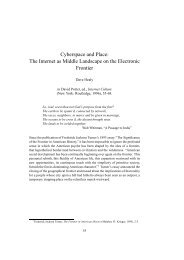PDF - The Metaphysics of Virtual Reality - University of Exeter
PDF - The Metaphysics of Virtual Reality - University of Exeter
PDF - The Metaphysics of Virtual Reality - University of Exeter
Create successful ePaper yourself
Turn your PDF publications into a flip-book with our unique Google optimized e-Paper software.
a computerized dimension where we move information about and where we find our<br />
way around data. Cyberspace renders a represented or artificial world, a world made<br />
up <strong>of</strong> the information that our systems produce and that we feed back into the system.<br />
Just as a chessboard sets up the checkered game space <strong>of</strong> its own world <strong>of</strong> rooks and<br />
knights, pawns and bishops, so too the computer interface holds its field <strong>of</strong> moves,<br />
hierarchy <strong>of</strong> files, places to go, and relative distances between points <strong>of</strong> interest. We<br />
inhabit cyberspace when we feel ourselves moving through the interface into a relatively<br />
independent world with its own dimensions and rules. <strong>The</strong> more we habituate<br />
ourselves to an interface, the more we live in cyberspace, in what William Gibson calls<br />
the "consensual hallucination." 1<br />
As the interface shades into cyberspace, the dark atmosphere <strong>of</strong> George Segal’s<br />
sculpture seeps in. This interface brings with it a troubling ambiguity. <strong>The</strong> term interface<br />
originated with the mundane hardware adapter plugs used to connect electronic<br />
circuits. <strong>The</strong>n it came to mean the video hardware used to peer into the system. Finally,<br />
it denotes the human connection with machines, even the human entry into a<br />
self-contained cyberspace. In one sense, interface indicates computer peripherals and<br />
video screens; in another, it indicates human activity connected by video to data. <strong>The</strong><br />
double meaning makes us pause: How peripheral is the human? How much <strong>of</strong> the system<br />
do we own when we enter the door <strong>of</strong> cyberspace? Where are we when s<strong>of</strong>tware<br />
architects shape the datascape into endless mazes <strong>of</strong> light attracting us like moths to<br />
a flame? <strong>The</strong> very idea <strong>of</strong> an interface points to an impending future that may be our<br />
fate, even fatal. <strong>The</strong> cover <strong>of</strong> Time floats like an afterimage.<br />
Cyberspace can cast a spell <strong>of</strong> passivity on our lives. We talk to the system, telling<br />
it what to do, but the system’s language and processes come to govern our psychology.<br />
We begin as voyeurs and end by abandoning our identity to the fascinating systems<br />
we tend. <strong>The</strong> tasks beckoning us to the network make us forget our elemental loss in<br />
the process. We look through the interface unaware as we peer through an electronic<br />
framework where our symbols—words, data, simula-<br />
1 William Gibson, Neuromancer (New York: Ace Books, 1984), p. 51; Gibson, Count Zero (New<br />
York: Ace Books, 1986), p. 38.<br />
79
















